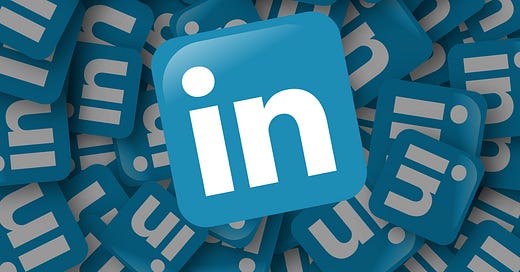The Only Good Social Network Is . . . LinkedIn?
Have the careerist overachievers succeeded where the Boomers and angry partisans failed?
Every week I highlight three newsletters that are worth your time.
If you find value in this project, do two things for me: (1) Hit the like button, and (2) Share this with someone.
Most of what we do in Bulwark+ is only for our members, but this email will always be open to everyone. To get it each week, sign up for free here. (Just choose the free option at the bottom.)
1. Big Technology
Strange new respect for . . . LinkedIn?
I’ll be honest, my mental image of LinkedIn has been frozen in 2013 when it was the company that did creepy stuff to spam your address book. I found the LinkedIn UX to be one of the worst on the internet and as an HR tool it was, to me, utterly useless. The handful of headhunters who found me via LinkedIn over the years were clearly barking up the wrong tree—I was a terrible fit for the jobs they were trying to fill. And the reverse has also been true: I’ve never found LinkedIn helpful in hiring people.
But things change and maybe my use case is atypical, since my world is public-facing.
Alex Kantrowitz is here to argue that LinkedIn is the only healthy social network:
On most social networks, you can be a jerk with little consequence. Twitter is filled with anonymous, bile-spewing users who corrode the network’s tone. Facebook may require you to use your “real name,” but being a jerk can mostly cost you Facebook “friends,” and since you likely have more of those than friends in real life, you can spare a few. On LinkedIn, being a jerk has consequences. It threatens your ability to get your next job, strike your next partnership, or find your next customer. You use your real identity there, and what you say has ramifications. This encourages people to pick their fellow users up, not tear them down. . . .
Most social networks make money via advertisers (their real customers), so they try to keep people (users) as engaged as possible, even if it requires some sacrifices. When you run an ad business, it’s okay if a certain percentage of the platform hates each other, as long as they keep coming back to fight.
LinkedIn’s business model is different. About one-third of its revenue comes from advertising, but many of LinkedIn’s users pay to use its premium product, so its users are its customers, and the interests are aligned. LinkedIn also sells a premium product to recruiters, who want to get people jobs, and creepy targeting won’t help with that. LinkedIn is able to sacrifice short-term engagement for long-term goals — as noted above — because its business model incentivizes it. . . .
LinkedIn’s share button doesn’t allow you to pass along other people’s posts without accountability. Unlike Twitter’s retweets, posts on LinkedIn show up with your name and photo when you share them, adding a layer of ownership that’s missing on Twitter. There’s also little incentive to share dunks or outrage due, again, to the disincentives for being a jerk.
Read the whole thing and subscribe to Big Technology.
2. Petition
Sometimes there’s so much beauty in capitalism that I feel like I can’t take it, like my heart’s going to give in. Here’s the bros at Petition on Johnson & Johnson:
Look. We know we rag on the restructuring industry, like, all…of…the…time. Deservedly so. But there is something to be said for stewarding stressed and/or distressed companies out of trouble, whether that is in or out of court. It’s trite AF but true that the industry serves a public good: the work restructuring pros do saves companies from liquidating and disappearing into the history books (like they might in jurisdictions in other parts of the world), which, in turn, saves jobs,* preserves federal, state and local tax revenue and, in the most dire of cases, may even keep communities afloat.** It often takes a meaningful amount of knowledge, expertise and strategy to guide these processes and without such astute guidance, a number of salvageable situations may go by the wayside. Sometimes calamity is or can be avoided through some truly impressive creativity. And the industry has seen some new “technology” in the past several years that has pushed things in the right direction — whether that is the one-day super-prepackaged filing or Zoom hearings that make proceedings not only cheaper (no unnecessary travel at the client’s expense) but also more accessible to various parties in interest.
But sometimes things get a little too cute.
Enter Johnson & Johnson Inc. ($JNJ) and the “Texas Two-Step” (also called “divisive” or “divisional” mergers). The Texas Two-Step is a way of describing when a company with a f*ck ton of potential tort liabilities — in the case of JNJ, liabilities arising out of suits alleging that JNJ’s baby powder caused ovarian cancer — (i) uses obscure Texas corporation law (from the Texas Business Organization Code) to spinout a Sh*tco artificially housing any potential tort liability from a HealthyCo and then (ii) files that Sh*tco for bankruptcy to avail it of the bankruptcy code’s channeling injunction provision and claims management process (which was designed for asbestos cases but has since been used in a variety of cases, including Takata and Purdue Pharma). This has the effect of limiting HealthyCo’s overall liability.
If that sounds shady as f*ck to you … well … you’re not wrong.
My response:
3. Popular Information
Judd Legum did some digging on a story The Bulwark started and it’s great stuff:
What is West Nova News? And what does it have to do with Ian Prior, the former spokesperson for Attorney General Jeff Sessions? This is where things get interesting.
West Nova News appears to be a standard local news website. It is not. Rather it is part of a massive network of websites linked to "conservative businessman Brian Timpone." There are more than 1300 sites currently in the network, including at least 28 that operate in Virginia.
The sites in Virginia look identical and feature much of the same content. Most of the articles do not have a byline and are automatically generated. . . .
Timpone has a long history of leveraging "low-cost automated story generation." A previous company run by Timpone, Journatic, "attracted national attention and outrage for faking bylines and quotes, and for plagiarism."
Journatic was rebranded Locality Labs and is now part of the Metric Media network, which operates the 1300+ local news sites. Metric Media boasts that it produces "over 5 million news articles every month." It has claimed to be "the largest producer of local news in the United States."
West Nova News and the other news sites in the network have little advertising and no subscription fees. The Columbia Journalism Review linked funding for sites in the network to “the dark-money ATM of the conservative movement" and "a Catholic political advocacy group that launched a $9.7 million campaign in swing states against the Democratic presidential candidate Joe Biden." . . .
But donations aren't the only way that the Metric Media network funds its work. And this is where Ian Prior enters the story.
An investigation last year by the New York Times found that Metric Media sites operate on a "pay-to-play" system. In 2020, a freelance journalist was paid $22 to write an "article calling out Sara Gideon, a Democrat running for a hotly contested U.S. Senate seat in Maine, as a hypocrite." After the story was published in the Maine Business Daily, which is part of the Metric Media network, the freelancer received an email saying the "client" who ordered the article had requested she add "more detail."
The client was Ian Prior, who also ordered articles promoting Senator Lindsey Graham (R-SC) and Senator Roy Blunt (R-MO). Prior, a longtime Republican operative, previously worked for the Senate Leadership Fund, a Republican PAC which spent millions on ads to defeat Gideon.
In this way, Prior and other clients can use the network to launder partisan attacks as "news." Quotes from sites in the Metric Media network can then be used in political mailers or in television ads with the authority of a neutral source. In some cases, the publications themselves are delivered "unsolicited, to doorsteps." The clients pay Metric Media thousands to produce "news" that meets their specifications.
Read the whole thing and subscribe to Popular Information.
If you find this valuable, please hit the like button and share it with a friend. And if you want to get the Newsletter of Newsletters every week, sign up below. It’s free.






